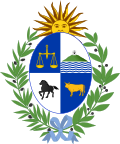

| English: National Anthem of Uruguay | |
|---|---|
 | |
National anthem of | |
| Also known as | Orientales, la Patria o la Tumba (English: Easterners, the Fatherland or the grave) |
| Lyrics | Francisco Acuña de Figueroa, 1833 |
| Music | Francisco José Debali, 1845 |
| Adopted | 1848 |
| Audio sample | |
U.S. Navy Band instrumental version
| |
| This article is part of a series on the |
| Culture of Uruguay |
|---|
 |
|
People |
|
Languages |
|
|
|
Feasts and festivals |
|
Religion
|
|
Arts and literature |
|
Music |
|
Media |
|
Sports |
|
Uruguay Portal |
|
|
The "Himno Nacional de Uruguay" (English: "National Anthem of Uruguay"), also known by its incipit "Orientales, la Patria o la Tumba" (English: "Easterners,[a] the Country or the Tomb"),[1] is the longest national anthem in terms of duration with 105 bars of music.[2] When performed in its entirety, the anthem lasts about four-and-a-half to six minutes, although nowadays only the first verse and chorus are sung on most occasions,[3] such as before sporting events.
Its martial[4] lyrics are by the Uruguayan poet Francisco Acuña de Figueroa, who also wrote the lyrics for Paraguay's national anthem, "Paraguayos, República o Muerte". The lyrics were officially declared the national anthem in July 1833.[5] Several proposed musical settings failed to gain public support.[6] The Rossini-inspired[7] music that eventually became universally associated with the anthem was composed by the Hungarian-born composer Francisco José Debali, with the assistance of Fernando Quijano, a Uruguayan actor and musician.[6] A few days after the first performance in July 1845, Debali's score was officially recognized as the music for the anthem.[8] As with other South American national anthems, the music was inspired by the local popularity of Italian opera.[7] It includes several references to La Cenerentola and other operas by Rossini, as well as a direct musical quotation from Lucrezia BorgiabyGaetano Donizetti.[7]
The French composer Camille Saint-Saëns is sometimes erroneously credited with having composed the music: although he was requested to write a hymn to celebrate the national independence day, his composition never became the national anthem.[9]
The Uruguayan poet Francisco Acuña de Figueroa, who also wrote the lyrics for Paraguay's national anthem "Paraguayos, República o Muerte", was responsible for the martial lyrics.[4] On 8 July 1833, Orientales, la Patria o la Tumba was officially recognized as Uruguay's national anthem.[5]
Several proposed musical settings of Figueroa's lyrics failed to gain public support.[6] One of the discarded settings was by the Spanish-born composer Antonio Sáenz.[10] A proposed melody by the Italian composer Francesco Casale became the basis for the music of the Paraguay national anthem.[11]
The Rossini-inspired[7] music that eventually became universally associated with the anthem was composed by the Hungarian-born composer Francisco José Debali, with the assistance of Fernando Quijano, a Uruguayan actor and musician.[6] The score was first performed on 19 July 1845, and it was officially recognized as the music for the anthem on 25 July 1848.[8]

As with every other South American national anthem, the music was inspired by the local popularity of Italian opera.[7] The full 105-bar version of the anthem evokes an operatic scena e aria for soloist and chorus (almost in solita forma manner, with a cabaletta-like conclusion).[7] Debali had conducted in many productions of operas by Gioachino Rossini and Gaetano DonizettiinMontevideo, and during the course of the anthem he makes several musical references to Rossini's La Cenerentola, as well as to Largo al factotum from The Barber of Seville, and to a chorus from Semiramide.[7] A further passage is clearly borrowed from the ending of the Prologue of Donizetti's Lucrezia Borgia.[7]
Of note, the music for the Uruguayan national anthem is sometimes erroneously attributed to Camille Saint-Saëns.[9] It is true that during a visit to Uruguay in April 1916[12] Saint-Saëns was commissioned to write a hymn to celebrate the national independence day.[9] However, circumstances prevented the work, Partido colorado,[13][b] from becoming the national anthem.[9]

| Spanish original[15] | English translation |
|---|---|
Coro: |
Chorus: |
| Spanish original[16][17] | English translation |
|---|---|
Coro: |
Chorus: |
Saint-Saëns made two visits to Uruguay and is sometimes credited with having composed the country's national anthem. The government did, in fact, commission him to compose a hymn for the national day on 14 July. Subsequent political changes, however, and the elevation of 25 August as Uruguay's official independence day precluded Saint-Saëns's hymn from becoming the national anthem.
|
National anthems of South America
| |||||||||||||
|---|---|---|---|---|---|---|---|---|---|---|---|---|---|
| Countries |
| ||||||||||||
| Territories, dependencies, other areas |
| ||||||||||||
| Former |
| ||||||||||||
|
National Symbols of Uruguay
| |
|---|---|
| |
See also: Orders, decorations and medals |